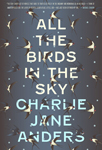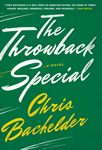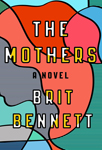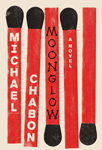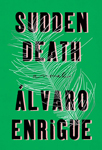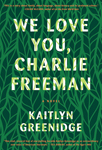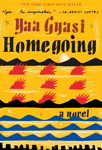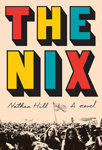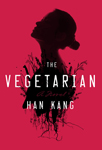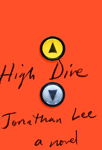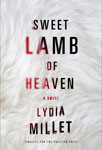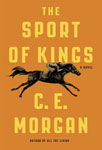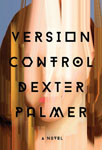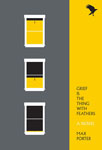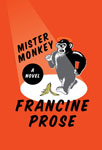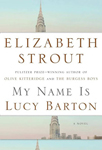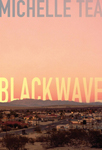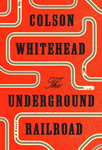by Charlie Jane Anders
Buy it at Powell’s »Caille Millner: First, I’d like to say how moved I am by the fact that the two finalists, Homegoing and The Underground Railroad, both address American slavery. It shows the importance of that subject’s continuing historical and social importance in this country.
But that doesn’t make it an easy subject to write about. The best fiction is laser-focused on the specifics of someone’s humanity; how do you square that imperative with an evil system that was designed to erase the humanity of an entire people?
Yaa Gyasi does it in Homegoing by situating individuals in a specific moment and asking readers to fill in the blanks with the grand sweep of history she covers. Colson Whitehead follows a single protagonist, Cora, as she explores the varieties of horror each slave state had to offer. Both are alive with history and remarkable stories, but unfortunately, Cora was thinly drawn, and The Underground Railroad suffers for it.
I needed to be fully invested in Cora as my guide through this American house of horrors, but she never quite came alive to me—I couldn’t hear her voice in my mind, or picture her face, or sometimes even understand her motivations for taking action. Gyasi doesn’t always give each of her characters enough time to fully develop, but she gave each one of them enough individuality to make an impression as living, breathing people locked into a horrific thread of history. My Rooster winner is Homegoing.
| The Underground Railroad | Homegoing |
|---|---|
| 0 | 1 |
Aaron Bady: Homegoing is a remarkable first novel, but The Underground Railroad is the kind of book that only an artist at the height of their craft could pull off, merging speculative fancy and the horrible realism of fact in the same, singular imaginative gesture. It could have gone off the rails at so many places, and yet it never does, not even once.
| The Underground Railroad | Homegoing |
|---|---|
| 1 | 1 |
Reyhan Harmanci: I have a coworker who often describes TV and film creators as “world-builders,” a word that seemed laughably LA at first but now just normal, even good, as a description. Yaa Gyasi and Colson Whitehead would certainly count as world-builders. In constructing sprawling set pieces that offer humor as well as horror, these two writers made mincemeat of the competition this year.
But which is the best? Forced under deadline to pick a favorite, I have to declare The Underground Railroad to be the winner. This is disappointing, I know. You WANT to choose a wildly talented first-time novelist as the champ. I certainly do! Sadly for underdog fans, The Underground Railroad is just too good to deny. Whitehead’s imagination is matched by his narrative control, the kind of evolution in craft that rewards loyal fans. I can’t imagine that this war of the world builders is over, though; one of these books is already in production for Amazon. Can the other be far behind?
| The Underground Railroad | Homegoing |
|---|---|
| 2 | 1 |
Will Chancellor: Colson Whitehead’s collapsed time (South Carolinian skyscrapers, Great Society ideals, elevators, Tuskegee biopolitical brutality) or Yaa Gyasi’s expanded time (to me, Marcus’s deep-time thesis was an on-the-nose description of Homegoing)?
Gyasi’s astonishing chapter on the convict leasing system (“H”) that nails the bullshit of the 13th Amendment, textually linking being a slave to being a criminal, or Whitehead’s North Carolina which, horribly, is not that far from black exclusion laws in northern states?
Both books are Rooster-worthy. But I’ll choose The Underground Railroad for the brilliance of its final third and the lasting horror of the attic.
| The Underground Railroad | Homegoing |
|---|---|
| 3 | 1 |
Rahawa Haile: Both are tremendous works with disparate narrative aims. However, the very structure of Homegoing champions world-building over character development. This is intentional, and considering the nature of the world being constructed, is heavy, necessary work. But it means that investment in time and place trumps investment in characters. If anything, horror is the novel’s true central figure. The resulting vignettes make for an outstanding short story collection, but a somewhat skeletal novel.
| The Underground Railroad | Homegoing |
|---|---|
| 4 | 1 |
Susannah Cahalan: I’m still recovering from the brutal magic of Cora’s odyssey. I’m with Oprah: The Underground Railroad has my enthusiastic vote.
| The Underground Railroad | Homegoing |
|---|---|
| 5 | 1 |
Tim Rinehart: Colson Whitehead’s The Underground Railroad has a unique voice and brilliant narrative that is undeniably powerful. I read it months ago, which made Homegoing the challenger in this matchup. Both are amazing books that tackle broad, ugly topics. Strong spiritual connections and surprising intimacy make slavery and its legacy uniquely, terrifyingly accessible. But the scope that Yaa Gyasi tackles in Homegoing is epic. I found that the intervals between chapters gave me time to breathe and let go before pressing onward. Both are worthy of the Rooster, but I’m voting for Homegoing.
| The Underground Railroad | Homegoing |
|---|---|
| 5 | 2 |
Bim Adewunmi: I want to make it clear that this is an utterly wretched decision. I received precisely equal amounts of pleasure and horror and (slivers of) joy from each of these finalists. The stories Whitehead and Gyasi have told here are so horribly, intimately intertwined that it feels utterly wrong to pick one over the other. In the end, I chose the more surefooted storyteller. In vain have I struggled. It will not do. My feelings will not be repressed. You must allow me to tell you how ardently I admire and love The Underground Railroad. Ugh, the Tournament of Books.
| The Underground Railroad | Homegoing |
|---|---|
| 6 | 2 |
Pamela Ribon: I read The Underground Railroad in just under a blink and I haven’t truly caught my breath since. Colson Whitehead spends not one second easing the reader into brutality, making every page ache with reality and humanity. While I loved taking my time through the gorgeous prose and compelling characters of Homegoing, and appreciated the quiet moments of love and hope in a story filled with tragedy, it is Cora’s journey that left a permanent mark on my heart.
| The Underground Railroad | Homegoing |
|---|---|
| 7 | 2 |
Isaac Fitzgerald: Look. I love Homegoing. I love it. It was one of my best books of the year in 2016 and I literally interrupted Tamron Hall so I could shout it out on the Today Show. If you haven’t read it, read it. It’s a riveting, gorgeous debut with an interesting structure that gathers a powerful head of steam over the course of the book, as other judges have mentioned. But, as I stated in my judgment, The Underground Railroad isn’t just one of my best books of 2016: It was, in my opinion, the best book of 2016. Sometimes your favorite book isn’t the book getting all the love; sometimes you’re rooting for the underdog. But when it comes to The Underground Railroad, I think Oprah got it right and the New York Times got it right and the National Book Awards got it right and my mom got it right. Winner: The Underground Railroad. Best book of the year.
| The Underground Railroad | Homegoing |
|---|---|
| 8 | 2 |
Nicole Chung: I devoured Homegoing in one long Sunday afternoon, unable to put it down—I loved the multigenerational story, the interwoven voices, the touchstone of the necklace. The Underground Railroad took me closer to a week to finish, as branches of Cora’s flight kept worming their way back into my brain, prompting me to go back and re-read whole chapters before I could move on. I put this decision off until the last possible moment because I loved both these novels equally, but I’m going with The Underground Railroad: I had to work just a little harder for it, which made it all the more satisfying to reach the end and see the whole trail laid out behind me. It’s such a beautifully crafted map of a novel, and I am and forever will be in awe of it.
| The Underground Railroad | Homegoing |
|---|---|
| 9 | 2 |
Steph Cha: Somehow, both finalists of this year’s tournament are slavery novels with, in my opinion, the same structural flaw: They’re both written in episodes, with the stop-start flow that can make short story collections hard to get through with sustained enthusiasm. The Underground Railroad gathers more momentum by virtue of following one lead character, but Homegoing accomplishes more, and its panoramic scope—impossible to achieve without jumping generations every 30 to 40 pages—makes the unvaried pacing feel like a small and necessary trade-off. There’s plenty to admire about Whitehead’s novel, but I’m giving my vote to Gyasi.
| The Underground Railroad | Homegoing |
|---|---|
| 9 | 3 |
Kirstin Butler: Choosing one of these books felt like being asked to slaughter the rooster so that it could be awarded to only one of the authors. Couldn’t I just apportion each of them half, deserving as they both are of all the awards? My mind warred with itself; it was like a terrible, deeply personal African-American chalk circle. These novels stunned me with their scope, their imagery, their language, their humanity. Ultimately, I feel like the Whitehead was the more ingeniously constructed, which is why I’m choosing it. But I plead with you to go read them both! Otherwise the bird will have been sacrificed in vain.
| The Underground Railroad | Homegoing |
|---|---|
| 10 | 3 |
Jason Diamond: Jason was unable to write up a judgment by press time, though he was able to complete both books and pass along his decision: The Underground Railroad.
| The Underground Railroad | Homegoing |
|---|---|
| 11 | 3 |
Lili Loofbourow: An unwelcome choice, and I’ve struggled to write this. (Read these, I keep typing. Read them both.) There are brackets where I’d prefer ampersands, but: of these two intricate experiments in history, Colson Whitehead’s gorgeous The Underground Railroad pumped and pumped and rolled out of the light into a tunnel that no one had made, and won.
| The Underground Railroad | Homegoing |
|---|---|
| 12 | 3 |
V.V. Ganeshananthan: Both books are fantastic; each begins with a compelling woman, and broadens to take me across time and space. I started with Homegoing and was dazzled by its ambitious scope, which did not prevent it from depicting the quietest moments with the deepest sympathies. The Underground Railroad, too, is constructed marvelously; its ostensibly simple beginning builds to a narrative of undeniable and stunning power. The sentences are beautiful, the narrative bold, and the vision precise and unflinching. It’s The Underground Railroad for me, by a hair, for its harrowing details and its ferocity of language.
| The Underground Railroad | Homegoing |
|---|---|
| 13 | 3 |
Miranda Popkey: Literary prizes are—well, they’re just a bit silly. This is a fact the Rooster’s bracket system is meant to illuminate, pitting books against one another as if they were basketball teams, as if there could be a winner. What it ultimately comes down to is personal preference: the judges like one book slightly better than the others. This judge, for example, liked The Underground Railroad slightly better than Homegoing. Its particular narrative strategy—focusing on one character, plumbing a singular depth—worked better on me than did Homegoing’s—inhabiting many characters, investing in breadth. Does that mean The Underground Railroad is a better book? For me, perhaps. But for you? You’d have to tell me a little about yourself before I could hazard a guess.
| The Underground Railroad | Homegoing |
|---|---|
| 14 | 3 |
Match Commentary
By Kevin Guilfoile & John Warner
John Warner: There it is. A bunch of very close individual choices that wind up with a comfortable victory for The Underground Railroad. In another year, not up against a book that could be an enduring classic, Homegoing is easily Rooster-worthy, but here, it just couldn’t get over the top.
Has the Rooster once again crowed the Pulitzer winner as it did in 2007, ’08, ’11, and ’14? I recently put its odds at 3-1 to win, making it the second favorite against the field. I’ll say this: It wouldn’t be a surprise if it won. We’ll find out on April 10.
It’s worthy, but of course, so many books are worthy. In fact, guess who agrees with me? Our 2017 Rooster champion, Colson Whitehead, who offered these thoughts on being informed of his victory:
This is very neat—thanks, judges, for being so kind. I will cherish this literal rooster-turned-metaphorical rooster for years to come. It was an honor to see my book in the company of such awesome work by these wonderful talents—and shout-out to Yaa Gyasi, who wrote an incredible novel and is a really cool person, to boot!
Kevin Guilfoile: Colson Whitehead has been so good for so long and this year he writes a book that hits the zeitgeist sweetspot: Sweetgeist? Zeitspot? Sweetzeit? This was one of my favorite fields of novels in 13 years of the Rooster, but every time I tried to compare a book I loved to The Underground Railroad I always gave the nod to Whitehead. There was the gravitas gap we talk about every year, but also the book is just so assured. Any prize judge reading The Underground Railroad will feel like he’s interviewing an applicant who knows he already has the job.
As Judge Popkey notes, however, being forced to choose The Underground Railroad over Homegoing is preposterous, which is frankly why we started doing this 13 years ago. We were just being cheeky. It turns out the damn thing kind of (sort of) has a point after all, and it’s not to establish an orthodoxy about which books are better than others, or even which kinds of books are better than others, but to figure out why each of us likes what we like, which is a far more complicated endeavor than I could have imagined. And that didn’t happen (or at least I didn’t figure it out) until the commentariat fashioned itself into a real community, and all of us here at the ToB owe every person who comes back here every day to read the verdicts and to discuss the books a giant hug and a cup of cocoa. It’s like we invented some dumb Flappy Finches phone app that wasn’t supposed to do anything except waste your time, and you guys figured out how to use it to diagnose bird flu or something.
So, hugs.
John: There’s something in my eye. As a kid who grew up in an independent bookstore, I was especially psyched to see our booksellers involved this year. So, thank you to Portia Turner and Kyle Curry from The Book Cellar, Jeff Martin at Magic City Books, Lindsay Lynch and Halley Parry from Parnassus Books, Kelsey Ford and Katherine Kearns of Skylight Books, Dustin Kurtz at Books & Books Grand Cayman, Sue Kowalski and Jenny Fischer from The Bookstore, Land Arnold of Letters Bookshop, and Ashleigh Brantingham and D Lozano from ToB official book sponsor Powell’s.
So, a deep thank you to everyone who plays a role in making this happen, the number which grows larger every year.
Kevin: With that in mind, please feel free to give a shout-out to your favorite local bookstore (and especially, your favorite bookseller) in the comments—you may see them featured here in the future.
Nozlee Samadzadeh: While we’re praising booksellers, a special shout-out to Ashleigh at Powell's for her work behind the scenes, shipping books to our judges in the months leading up to the tournament. We were thrilled to have her out in front this year as a commentator, even though her chosen favorite, The Vegetarian, didn't quite make it.
Kevin: For those who would like even more Rooster discussion, WNPR’s Colin McEnroe Show (or is it “The” Colin McEnroe Show?), which does an hour on the ToB every year, convened its usual panel of smart New England readers and created their own alternate Final Four from the ToB field. It’s a terrific discussion, and by listening in a few folks might be able to imagine a reality where their own favorite book advanced past the early rounds.
In that vein, if I can take a moment to give one last shout-out to one of my favorite early exits, (and I know you’re with me on this one, John), please don’t forget High Dive.
John: And don’t forget Mister Monkey and Sweet Lamb of Heaven and—I’m going to stop before I name every book in the tourney.
And don’t forget that we’re already scouting for next year. I’ve already read a number of really pleasurable books this year, and two that stand out thus far are Jami Attenberg’s All Grown Up and Mohsin Hamid’s Exit West. I’m partway through Dan Chaon’s Ill Will and it’s so tense that I simultaneously can’t put it down and want to run from it. I haven’t yet read Lincoln in the Bardo, but it feels like a book that’s going to be in the mix.
Kevin: I am just 50 pages into Ill Will, and it’s great. If we’re looking for a pair of books that might check the kinds of relevancy boxes that our finalists did this year, I see Kim Stanley Robinson’s 2140 and Jeff VanderMeer’s Borne, both speculative treatments of climate change, on my bedside table. Ali Smith, winner of the second-ever Rooster, has a new novel this year, and so does the third ToB champion, Cormac McCarthy.
Of course I want to know what the commentariat is looking forward to this year (or if any books in 2017 have knocked them out so far).
John: I guess that’s it for us. I’m carefully hanging my blood red blazer in the closet, where it shall wait until the Rooster crows again.
Kevin: You don’t have to be strangers, though. You can find John on Twitter at @bibioracle, and me at @kevinguilfoile. Hit us up over the next few months and let us know about new (or old) books you’ve fallen in love with. Before we end this year’s tournament for good, we have more words from ToB poobahs, Rosecrans Baldwin and Andrew Womack.
Rosecrans Baldwin: Thanks, Kevin and John, and not just for this year, but for 13 years of excellent, insightful commentary. Congratulations to all the books and authors in contention, and thanks also to all of our judges this year and the independent booksellers who joined us. A massive big up to Field Notes, our presenting sponsor, and our books sponsor, Powells.com, and a massive thank you to all the readers who followed along, commented, lurked, and/or otherwise participated in the tournament this year.
Andrew, before we get to talking about what’s happening this summer, do you want to tell us who won yesterday’s contest to guess the spread?
Andrew Womack: Yes. First, though, a surprise: In addition to the two prize packs from Field Notes, we also have a pair of gift cards from Powell’s. There were five correct guesses, so we used random.org to pick two of them: The winners are LetsGoThrow and Michael Meloy.
Rosecrans: Congratulations to the winning duo! Winners, please email us with your handle, proper name, and mailing address so we can get your prizes in the mail.
And now the moment we’ve all been waiting for.
Andrew: This June, the Rooster returns. Each month over the summer, June through August, we’re going to read two books all together. Think of it as a more leisurely, sunburned, slightly toasted version of the ToB—an online book club with a Rooster twist.
Rosecrans: Here’s the plan: Each month, one of the books will be chosen by a well-known novelist, who will join us for discussions, and the other will be selected by the ToB committee, and there will a theme to each pairing. We’re going to read the books simultaneously, and meet each week to discuss how it’s going. Then at the end of the month, one book will reign supreme—in the ToB-ish way that “reign supreme” is a completely false notion, but you get the idea. A lot’s still to be determined (we haven’t really slept much this month), but you should expect typical ToB shenanigans, author visits, mucho chatter—and the fact that one of the books we all read over the summer will get an automatic entry card into next year’s tournament, as decided by you, the readers.
Andrew: And finally, again, thank you to everyone who supported us by becoming a Sustaining Member. If you haven’t already joined, please do so now. It only takes about 30 seconds, but it makes an enormous difference in our ability to keep this thing rolling—this ridiculous idea that’s somehow become one of the best discussions about books currently alive. (We don’t kid ourselves: that “somehow” is in many ways thanks to you. So thanks again.)
Nozlee: And one last thanks to Drew Broussard and Christopher Hermelin of So Many Damn Books for their weekly tournament recaps, humorous costumes, and musical interludes. They’ll be back for a final wrap-up tomorrow at noon Eastern on the ToB Facebook page (joined by a special guest who may or may not be, uh, me), breaking down this last week of judgments and taking questions from viewers.
See you next year soon.



